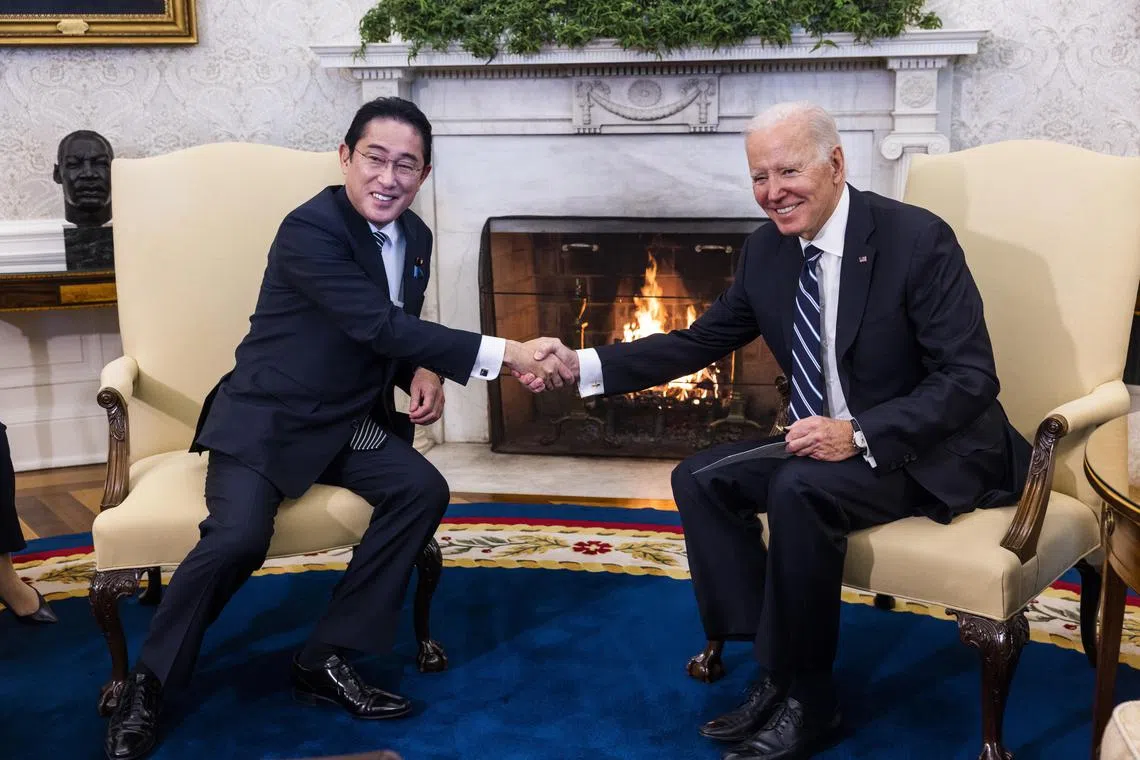Biden, Kishida vow deeper security cooperation as China looms large
Sign up now: Get ST's newsletters delivered to your inbox

US President Joe Biden and Japanese Prime Minister Fumio Kishida vowed on Friday to cooperate closely in the realms of defence and economics.
PHOTO: EPA-EFE
Follow topic:
WASHINGTON – US President Joe Biden and Japanese Prime Minister Fumio Kishida vowed on Friday to cooperate closely in the realms of defence and economics,
China loomed large throughout the summit, with both leaders stressing the threat that an increasingly assertive and muscular Beijing posed to the international order and regional stability.
“We are modernising our military alliance, building on Japan’s historic increase in defence spending and new National Security Strategy,” said Mr Biden, as he hosted Mr Kishida at the White House.
“Let me be crystal clear: The United States is fully, thoroughly, completely committed to the alliance and, more importantly, to Japan’s defence,” he added.
The two countries also inked a deal to boost cooperation in the peaceful exploration of space, an agreement that comes as they plan for missions to the Moon and Mars.
Friday’s summit at the White House capped Mr Kishida’s week-long tour
The meeting comes a month after Japan drastically overhauled its National Security Strategy to almost double its defence spending
Those three countries threaten the peace and prosperity of the Indo-Pacific region, said Washington and Tokyo in a joint statement on Friday.
“The Indo-Pacific faces growing challenges, from actions inconsistent with the rules-based international order by China to provocations by North Korea.
“In Europe, meanwhile, Russia continues to wage its unjust and brutal war of aggression against Ukraine,” said the statement.
It added: “This landscape demands that the United States and Japan continue to strengthen our individual and collective capacity.”
Mr Biden reiterated America’s “unwavering commitment” to the defence of Japan, and the two leaders also instructed their ministers to boost cooperation in developing and effectively employing Japan’s counterstrike and other capabilities, said the statement.
Mr Kishida said that Japan and the US were “facing the most challenging and complex security environment in recent history”.
He pledged that the two countries would play an even greater role in the region and the world, stressing that they shared fundamental values such as democracy and the rule of law.
The two leaders soundly condemned Russia’s invasion of Ukraine and warned that any use of a nuclear weapon by Russia in Ukraine “would be an act of hostility against humanity and unjustifiable in any way”.
Washington and Tokyo also promised to work together even more closely on economic security, including by protecting and promoting critical technologies such as semiconductors – a priority for the US, which is trying to cut China off from key chipmaking equipment.
They vowed to strengthen supply chains “among like-minded partners against threats such as economic coercion, non-market policies and practices”, in a veiled reference to China.
Later, Mr Kishida said in a speech at Johns Hopkins School of Advanced International Studies that China was the central challenge for both Japan and the US, and urged the countries together with Europe to act as one to counter China.
Japan’s concerns over China were further heightened in August 2022, when ballistic missiles launched by Beijing over tensions with Taiwan landed in waters near Okinawa.
In the days leading up to Friday’s summit, Washington and Tokyo announced several defence moves to strengthen their alliance militarily, such as upgrading a US Marine Corps unit in Okinawa.
American Enterprise Institute senior fellow Zack Cooper and non-resident fellow Eric Sayers argued in a commentary that Mr Kishida’s visit to Washington marked a sea change in the alliance, which was “shifting to a war footing”.
Tokyo’s defence spending surge and the other defence announcements made during the trip all “amount to a wholesale change in the US-Japan alliance’s approach to deterrence and warfighting”, they wrote on Thursday in national security website Lawfare.
“All these steps will send a clear signal to China that Washington and Tokyo are... upgraded... for a contingency, including one in the waters around Taiwan,” they added.

